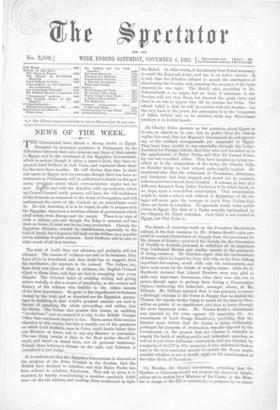The debate of yesterday week on the Procedure Resolutions related,
in the first instance, to Mr. Sclater-Booth's calm pro- posal to exempt Committees of Supply from the provisions for the closure of debate,—just as if the Society for the Prevention of Cruelty to Animals proposed to withdraw all its inspectors from Leadenhall Market and similar resorts of the purveyors of living creatures. Mr. Gosehen urged that the condensation of debate which he hoped for from this rule, so far from stifling important discussions, would stifle only the unimportant, and leave more room for the debate of weighty issues ; while Sir S. Northcote declared that Liberal Members were very glad to stifle even important discussions, when their own side was in power, though eager to prolong them during a Conservative regians,—instancing the behaviour, amongst others, of Mr. Dillwyn. Mr. Dillwyn rejoined that it was precisely to secure a thorough criticism of the Votes in Supply that he desired the Closure, the regular tactics being to spend all the time in Com- mittee on points of no significance, and then to hurry through the more important votes. Mr. Sclater-Booth's amendment was rejected, by 166 votes against 102 (majority, 61). Au amendment of Lord George Hamilton's, providing that the Speaker must believe that the debate is being deliberately prolonged for purposes of obstruction, was also opposed by the Government, on the ground that the Closure is intended to remedy the habit of making prolix and redundant speeches, as well as to put down deliberate obstruction, and was rejected, by a majority of 80(177 to 97); moreover, it was understood that so soon as the first resolution should be carried, the House might consider whether or not it should apply to the consideration of the other Rules of Procedure.


































